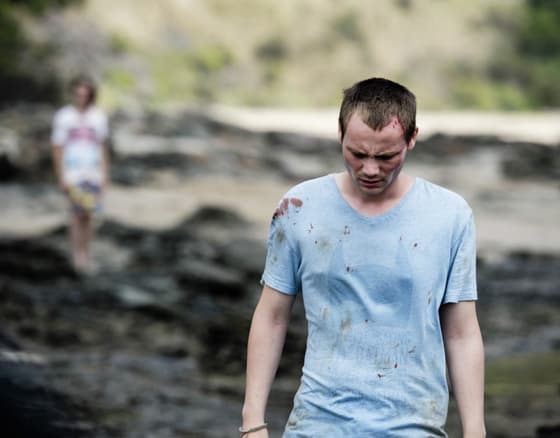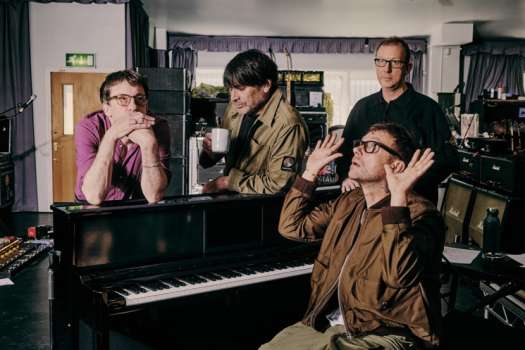Grant Scicluna's feature directorial debut, Downriver, is an unconventional murder mystery and treatise on the loss of childhood innocence. It's a sombre and deliberate work about death and redemption with an ominous tone and a mature restraint atypical of a first-time filmmaker, but it's also a peculiar dialogue about homosexual identity. It's several things at once, and not always entirely logical, which suggests that it's attempting to be a post-coming-of-age metaphor for an abuse victim.
James (Reef Ireland), a young man just released from prison, returns to the rural community where he was charged with the drowning murder of a boy. His caretaker (Kerry Fox) warns him against it — conditions of parole state he's not to come within proximity of Anthony (Tom Green), an old friend that was also at the scene of the murder — but James is keen on his single-minded pursuit of the truth. Having been a young boy himself when this heinous act was committed, he's uncertain of the details. The body was never found and James suffers from bouts of epilepsy when stressed, which leads him to believe that Anthony hid the body or pushed it "downriver."
On the surface, this low-key Australian thriller plays as a slightly more-dignified-than-usual whodunit. The restrained tone and looming, slowly panning photography generates a constant sense of tension and severity, which is punctuated by occasional bouts of brutal violence. But, outside of this accomplished style, the plot mostly follows James around the community, asking locals questions about dogs, geography and what might happen to a drowning victim if they weren't found.
Interestingly enough, Scicluna plays with this format but never presents a likely culprit other than Anthony. We see flashbacks of the boys at the scene of the crime and the experimental soundscape, allowing sounds and dialogues to blend into the next scene like a ghost, suggesting that there's simply more to that specific moment than we're allowed to see. Instead of offering additional clues, Scicluna focuses on cycles of sexual abuse, showing scenes of Anthony sodomizing and receiving forced oral sex from Damien (Charles Grounds), an effete teen boy living next door to James.
Later revelations dig deeper into the cycle of underage queer exploitation. James too is seen early in the film having a tender moment with a fellow male inmate. Oddly, every character within the age of transition from boy to man is homosexual in Downriver, which reiterates the central theme of how innocence is perceived and handled within the gay community. Since we learn that James too may have been reluctantly coerced into mature sexual acts at a young age, there's a sense that the death of the boy (whose body is missing) and James' resulting prison sentence is representative of the death of his boyhood and the self-imposed imprisonment that stems from sexual abuse. This is perhaps why James repeatedly puts himself in danger while seeking out the dead body (that may not even exist): he's trying to recapture and understand the childhood he lost. Without this, he is dead already.
Since the climax is somewhat anticlimactic, resulting mostly in telling imagery, it's clear that Downriver is a dual-layered analysis of how to find meaning in the past and how we reconcile our own fractured identities. It's also a film that handles the links between sex and violence rather astutely, as sex is depicted very much the same as violence is throughout; it's blunt, degrading and horrifying. Interestingly, non-sexual tenderness is handled with a softness that sex simply isn't afforded throughout this film. This suggests that these past sexual abuses have ultimately sullied the act and created a form of detachment and resentment towards the act of coitus for the victimized homosexual characters depicted.
It's these preoccupations with sexual specificities and tangents, which don't really pertain to the central mystery, that guide us to what Scicluna is saying with Downriver. And while it's certainly thought provoking, the lack of literal progression may alienate more conventional viewers; likewise, the touchy handling of queer politics could antagonize those who are particularly sensitive. While it may not be overly progressive to depict gay characters as either victims or predators — without any real in between — Scicluna isn't trying to vilify or subjugate; he's ultimately telling a story about the loss of innocence and how quiet, unspoken brutality can manifest in cycles. He's also raising an intriguing dialogue about the nature of being marginalized for sexual identity and addressing how it distorts one's sense of self.
(Happening Films)James (Reef Ireland), a young man just released from prison, returns to the rural community where he was charged with the drowning murder of a boy. His caretaker (Kerry Fox) warns him against it — conditions of parole state he's not to come within proximity of Anthony (Tom Green), an old friend that was also at the scene of the murder — but James is keen on his single-minded pursuit of the truth. Having been a young boy himself when this heinous act was committed, he's uncertain of the details. The body was never found and James suffers from bouts of epilepsy when stressed, which leads him to believe that Anthony hid the body or pushed it "downriver."
On the surface, this low-key Australian thriller plays as a slightly more-dignified-than-usual whodunit. The restrained tone and looming, slowly panning photography generates a constant sense of tension and severity, which is punctuated by occasional bouts of brutal violence. But, outside of this accomplished style, the plot mostly follows James around the community, asking locals questions about dogs, geography and what might happen to a drowning victim if they weren't found.
Interestingly enough, Scicluna plays with this format but never presents a likely culprit other than Anthony. We see flashbacks of the boys at the scene of the crime and the experimental soundscape, allowing sounds and dialogues to blend into the next scene like a ghost, suggesting that there's simply more to that specific moment than we're allowed to see. Instead of offering additional clues, Scicluna focuses on cycles of sexual abuse, showing scenes of Anthony sodomizing and receiving forced oral sex from Damien (Charles Grounds), an effete teen boy living next door to James.
Later revelations dig deeper into the cycle of underage queer exploitation. James too is seen early in the film having a tender moment with a fellow male inmate. Oddly, every character within the age of transition from boy to man is homosexual in Downriver, which reiterates the central theme of how innocence is perceived and handled within the gay community. Since we learn that James too may have been reluctantly coerced into mature sexual acts at a young age, there's a sense that the death of the boy (whose body is missing) and James' resulting prison sentence is representative of the death of his boyhood and the self-imposed imprisonment that stems from sexual abuse. This is perhaps why James repeatedly puts himself in danger while seeking out the dead body (that may not even exist): he's trying to recapture and understand the childhood he lost. Without this, he is dead already.
Since the climax is somewhat anticlimactic, resulting mostly in telling imagery, it's clear that Downriver is a dual-layered analysis of how to find meaning in the past and how we reconcile our own fractured identities. It's also a film that handles the links between sex and violence rather astutely, as sex is depicted very much the same as violence is throughout; it's blunt, degrading and horrifying. Interestingly, non-sexual tenderness is handled with a softness that sex simply isn't afforded throughout this film. This suggests that these past sexual abuses have ultimately sullied the act and created a form of detachment and resentment towards the act of coitus for the victimized homosexual characters depicted.
It's these preoccupations with sexual specificities and tangents, which don't really pertain to the central mystery, that guide us to what Scicluna is saying with Downriver. And while it's certainly thought provoking, the lack of literal progression may alienate more conventional viewers; likewise, the touchy handling of queer politics could antagonize those who are particularly sensitive. While it may not be overly progressive to depict gay characters as either victims or predators — without any real in between — Scicluna isn't trying to vilify or subjugate; he's ultimately telling a story about the loss of innocence and how quiet, unspoken brutality can manifest in cycles. He's also raising an intriguing dialogue about the nature of being marginalized for sexual identity and addressing how it distorts one's sense of self.




